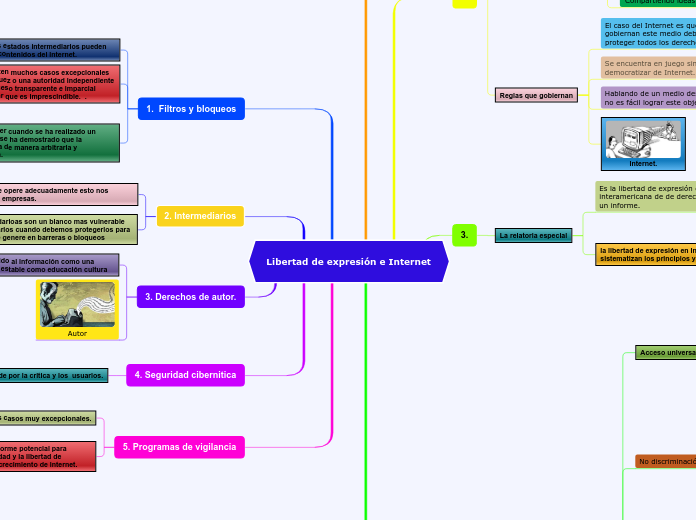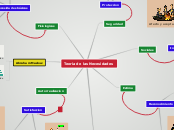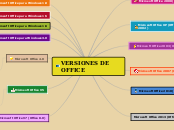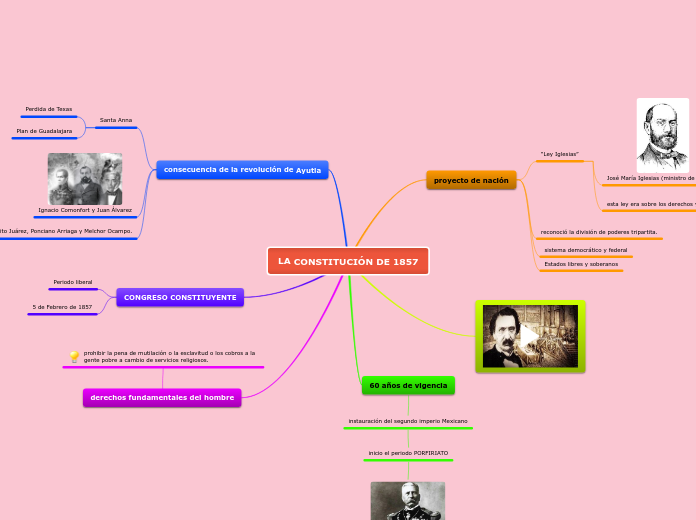Libertad de expresión e Internet
The part of speech is a category to which a word is assigned according to its syntactic functions. In English the main parts of speech are noun, pronoun, adjective, determiner, verb, adverb, preposition, conjunction, and interjection.
5. Programas de vigilancia
A conjunction is a word like 'if' 'but' or 'and' which is used to connect sentences or clauses together.
Aveces tiene como un enorme potencial para invadir y violar la privacidad y la libertad de expresión sucede por el crecimiento de internet.
Subordinating conjunctions are conjunctions that are used at the beginning of subordinate clauses. Some examples of these conjunctions are: although, after, before, because, how, if, once, since, so that, until, unless, when etc.
programa
Son legítimos en algunos casos muy excepcionales.
Coordinating conjunctions always connect phrases, words, and clauses. They are: for, and, nor, but, or, yet, so.
4. Seguridad cibernitica
A preposition is one of the most exciting parts of grammar. A preposition is used to describe the location of something in relation to something else.
Se entiende por la critica y los usuarios.
When a preposition consists of one word it is called single or simple preposition.
cibernitica
3. Derechos de autor.
An interjection is used to express emotion in a sentence.
Think of other interjections!
Autor
Debe estar protegido al información como una equidad donde se estable como educación cultura
2. Intermediarios
An adverb is used to describe a verb, but it can also describe an adjective or another adverb.
Adverbs normally help paint a fuller picture by describing how something happens.
Los intermedarioas son un blanco mas vulnerable que los usuarios cuando debemos protegerlos para evitar que se genere en barreras o bloqueos
The intensifiers strengthen adverbs adjectives and adverbs and down- toners make them weaker.
intermediarios
Es la red que opere adecuadamente esto nos incluye a las empresas.
1. Filtros y bloqueos
A numeral is a word or phrase that describes a numerical quantity.
Some theories of grammar use the word 'numeral' to refer to cardinal numbers that act as a determiner to specify the quantity of a noun, for example the 'two' in 'two hats'.
Solo puede suceder cuando se ha realizado un debido proceso y se ha demostrado que la información afecta de manera arbitraria y desproporcionada.
filtros y bloques.
Sin embargo existen muchos casos excepcionales en los cuales un juez o una autoridad independiente similar en un proceso transparente e imparcial pueden determinar que es imprescindible. .
En principio ni los estados intermediarios pueden filtrar o bloquear contenidos del Internet.
4
A pronoun is a word that can be used in place of a noun, typically after the noun itself has already been stated.
Existe 5 principales orientadores
Demonstrative pronouns are used to demonstrate (or indicate). This, that, these, and those are all demonstrative pronouns.
Neutralidad de la red.
A reflexive pronoun ends with ...self or ...selves and refers to another noun or pronoun in the sentence (usually the subject of the sentence). The reflexive pronouns are myself, yourself, herself, himself, itself, ourselves, yourselves, and themselves.
Lamentablemente los gobiernos o proveedores de internet toman este tipo de medida afectando a los usuarios finales sin que ellos puedan saberlo.
Unlike demonstrative pronouns, which point out specific items, indefinite pronouns are used for non-specific things. This is the largest group of pronouns. All, some, any, several, anyone, nobody, each, both, few, either, none, one, and no one are the most common.
De la red
el tipo de trato seria equitativo por ejemplo: es posible hacer que un sitio web se cargue mas rápido que otro o simplemente filtrar cierto tipo de información.
Es un principio según el cual todos los 1 y 0 que circulan en Internet toda la información deben ser tratados de la misma forma.
Privacidad.
Possessive pronouns are used to show possession. The possessive pronouns are mine, yours, his, hers, ours, and theirs.
Es necesario que existan garantías para asegurar que los datos privados de las personas estén protegidos ante intromisiones arbitrarias.
Privacidad
La libertad de expresión no se puede ejercer plenamente sin las protecciones que ofrece este derecho.
Pluralismo.
Ideas opiniones e información que hacen parte de la deliberación publica.
Como principio quiere decir que cualquier medida que que pueda afectar Internet debe ser destinada de asegurar mas y no menos.
Interrogative pronouns are used in questions. Although they are classified as pronouns, it is not easy to see how they replace nouns. Who, which, what, where, and how are all interrogative pronouns.
Pluralismo
No discriminación.
Barreras que limitan las personas en su derecho a usar Internet ya sea por razones ideológicas de genero raza, idioma o ubicación geográfica.
Que los estados deben asegurar que las leyes ni las condiciones sociales, económicas o culturales establezcan.
Reciprocal pronouns are used for actions or feelings that are reciprocated. The reciprocal pronouns are each other and one another.
Equidad
Acceso universal.
The personal pronouns are I, you, he, she, it, we, they. More often than not (but certainly not always), they replace nouns representing people.
Promueve la alfabetización digital o sea asegurar que la gente incluso en los lugares mas alejados sepa manejar esta tecnología.
Expandir
It refers directly to a specific noun or groups of nouns.
Que el estado debe promover el acceso de todas las personas a la red eso implica expandir la infraestructura de Internet.
3.
An adjective is a word that's used to describe a specific noun and to provide more detail to the listener.
La relatoria especial
Expresses a comparison between two entities or groups of entities in quality or degree.
la libertad de expresión en Internet que se sistematizan los principios y criterios generales.
Superlative adjectives demonstrate a higher level of comparison between entities.
Criterios generales.
Es la libertad de expresión de la comisión interamericana de de derechos humanos elaboro un informe.
2.
A noun is defined as a person, place, thing or idea. Proper nouns always begin with a capital letter. Common nouns, which are general words, such as 'cars,' are not capitalized.
Reglas que gobiernan
A noun which refers to a group of things/people.
Internet.
Compound nouns are words where two nouns have been stuck together to make a new noun. Compound nouns should be written as one word, without a hyphen.
Hablando de un medio descentralizada y abierto no es fácil lograr este objetivo.
Se encuentra en juego sin debilitar el potencial democratizar de Internet.
El caso del Internet es que las reglas que gobiernan este medio deben ser capaces de proteger todos los derechos.
Indagar es nuestro derecho
Countable nouns are nouns that can be counted, even if the number might be extraordinarily high.
Uncountable nouns are nouns that come in a state or quantity which is impossible to count; liquids are uncountable, as are things which act
like liquids.
Compartiendo ideas.
Buscar y recibir información de todo tipo.
aparición de Internet
Proper nouns are the names of specific people or places. They should always begin with a capital letter.
En la actualidad es el instrumento mas poderoso para expandir la libertad de expresión en su doble dimensión.
significado un avance enorme.
Esta un avance de Internet.
1.
A verb is an action word or 'doing' word that signifies movement in some way.
Derecho fundamental
A linking verb connects the subject with a word that gives information about the subject, such as a condition or relationship.
Sin censura y sin miedo a ser reprimidos o sancionados.
Sirve para la defensa de otros derechos humanos.
Grupos
Marginados y discriminados
Derechos de las minorías
Sociedad democrática
A verb with its own meaning: a verb that is not an auxiliary verb.
No puede decirse que existe una verdadera democracia allí donde no esta protegido el derecho de todas las personas.
Buscar, recibir y difundir información libremente.
La libertad de expresión es la piedra angular de toda sociedad democrática.









